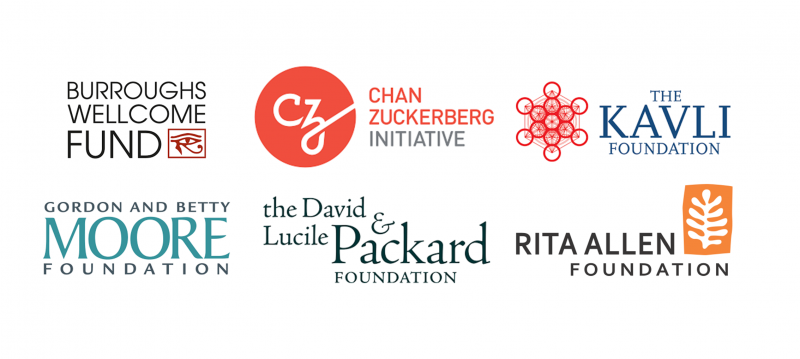
Stories

Position Announcement: Funder Collaborative Civic Science Fellow
The application submission period for this position has closed. Please check our civic science page for additional fellowship position postings in the future.
To catalyze widespread engagement with science and its societal implications, funders invite applicants for a Civic Science Fellowship.
Summary
A collaboration of funders with a shared interest in the relationship between science and society invite applicants for a Funder Collaborative Civic Science Fellow. The Fellow will work for 12 months to advance emerging collaborative work among relevant programs at the Burroughs Wellcome Fund, the Chan Zuckerberg Initiative, the David and Lucile Packard Foundation, the Gordon & Betty Moore Foundation, The Kavli Foundation, and the Rita Allen Foundation. The Fellow will be part of the inaugural class of Civic Science Fellows, which aims to build the capacity of emerging leaders, networks, and institutions working to meaningfully connect science and society in a time of rapid change.
Vision, Opportunity, and Background
The need for a more robust, mutual, and equitable relationship between science and society has never been more urgent. Individuals, communities, and our global population face accelerating and increasingly complicated challenges. Rapidly evolving, highly complex science contributes to these challenges and holds the promise of shaping solutions—gene editing, artificial intelligence, and ocean conservation are just a few examples of acutely relevant, socially charged, and potentially transformative areas of research. The research community must understand and respond to the societal context in which it exists if it is to remain a relevant and robust element of society. Charting the course for this science in democratic societies requires not only technical scientific answers, but also deep engagement with issues including ethics, community values and needs, economics, and public health.
The funders in the collaborative are brought together by a shared vision, one that we bring in our efforts to serve science communication, public engagement, science, and the public broadly. We believe science is one of our most important tools for developing knowledge about ourselves and understanding the world around us; however, it has become increasingly viewed as separate from society. Many science engagement efforts seek to focus on specific effects of this disconnect (e.g., threats to federal funding for basic science). We, with our partners in the field, have begun to explore what might be the primary causes of the problem, and the opportunities they present: to form new connections and collaborations that can fuel more meaningful, inclusive integration of science in society.
This shared understanding of the opportunity space has served as a catalyst for an emerging funder collaborative. We are in the position to build bridges and leverage different expertise and resources across sectors, from our organizations and others, in order to more effectively serve the scientific ecosystem as well as diverse communities affected by scientific discovery and application. A process of shared learning and exploration can accelerate our common understanding of approaches and techniques to effectively address the roots of the disconnect between science and society, as well as help us identify areas of shared collaboration or coordination for greater impact in supporting those leading, innovating, and working at this interface.
The initial cohort of Science in Society Collaborative members are philanthropies, each with individual missions and focus, but with substantial overlap in how we approach science engagement. We all support efforts that promote science as a way of knowing. We all believe that a lack of adequate knowledge about science within communities is not sufficient to explain the growing communication gap between scientists and society. We all recognize the need to diversify who is engaged in the scientific conversation. We all recognize that the field would benefit from evidence-based approaches and methodically developed best practices. And critically, we all agree that effective work in this field requires listening to and understanding specific communities and audiences in order to effectively engage with them.
The Position
The Burroughs Wellcome Fund, the Chan Zuckerberg Initiative, the David and Lucile Packard Foundation, the Gordon & Betty Moore Foundation, The Kavli Foundation, and the Rita Allen Foundation seek a Civic Science fellow who, through a 12-month fellowship, will help explore a common vision and identify paths forward for collaborative action and impact. We see an opportunity to coordinate our efforts; learn from each other; learn from grantees, partners, and diverse communities; and break down silos or jargon that may separate us. The Fellow will join a group who shares a commitment to increasing diversity in our own work and field, integrating justice and equity into the work we do, and ensuring an inclusive culture.
The Civic Science Fellow will initially work with the six foundations listed above to advance a shared vision, help each foundation learn about our peers’ specific goals and objectives related to this shared vision, and develop a strategy for moving forward on collaborations to reach our shared goals, serve diverse audiences, and catalyze more effective engagement with science. The Fellow will:
- Lead the development of a shared vision and strategy for future collaborative work among funders in the civic science space. This may take the shape, for example, of a shared blueprint—a strategic document outlining shared objectives and goals, a common theory of change, and an articulation of what success will look like, across multiple communities and objectives.
- Embed, or meaningfully connect with, each partner foundation to develop a more nuanced understanding of goals, trends, and theories of change.
- Connect with the field, communities of public engagement research and practice, and communities underserved by existing science communication efforts to allow their goals, objectives, and efforts to inform the blueprint.
- Facilitate and incorporate ongoing feedback from foundation partners. Share progress and insights on the blueprint development.
- Apply learnings from embedded experience and other resources to inform potential collective structures and approaches that foundation partners could use to advance field.
- Develop and present a set of recommendations (including, but not limited to, scope, sequencing, resourcing, and risks) detailing how the collaborative can work together to develop joint programming, co-invest, and share learnings, drawing on a growing body of related social scientific research, crossing disciplinary boundaries when helpful, and maintaining focus on benefiting and including diverse communities.
- Identify areas of prospective collaboration with other foundations active in work related to civic science, or interested in contributing to and applying best practices.
- Incorporate an approach for assessing the feasibility of ways forward described in the blueprint, as well as methods for ensuring ongoing shared learning from our collective efforts.
- Recommend necessary inputs and key milestones/timing to meet blueprint goals.
We believe the opportunity to experience each Foundation’s culture and processes will be an asset in the Fellow’s success to coordinate and support the collaborative. The Kavli Foundation, based in Los Angeles, CA, and/or the Rita Allen Foundation in Princeton, NJ, will provide the primary post for the Fellow. We expect the Fellow will spend meaningful time embedded with each foundation partner. We are willing to discuss potential variations of this location and approach with the Fellow, as long as it prioritizes meaningful time with each foundation.
The Civic Science Fellow will be part of the inaugural class of Civic Science Fellows—individuals housed at various institutions to advance a myriad of ways people and science connect. These fellows will attend one annual convening and participate in regular monthly meetings to share learnings from their different embedded perspectives.
The Fellow will report to, and be guided by, an advisory group composed of representatives from foundation partners.
Skills and Attributes
- 5+ years experience in science communication, public engagement with science, informal science education, learning, collective action, or related fields.
- Experience in crafting strategic, forward-looking plans and reports.
- Experience in program or project management.
- Strong written and verbal communication skills.
- Ability to work independently and collaboratively.
- Shares our commitment to increasing racial diversity in the science communication landscape, integrating justice and equity into the work we do, and ensuring an inclusive organizational culture.
- Familiarity with philanthropy.
- Ability and flexibility to travel, primarily in the United States.
- Have initiative, be entrepreneurial, and think strategically and long-term.
To Apply
Send a cover letter describing your interest in this position, a resume or CV, and a work or writing sample reflecting analysis of themes and opportunities, to civicscience@ritaallen.org. Applications received by August 15, 2019, will be given priority.
The salary for this full-time, 12-month position is $80K plus benefits.
We are committed to fostering an inclusive environment for people of all backgrounds. The Rita Allen Foundation is committed to a policy of Equal Employment Opportunity and does not discriminate on the basis of race, color, religion, creed, national origin or ancestry, sexual orientation or expression, gender, marital status, age, physical or mental disability, military status, genetic information or any other protected characteristic as established under law. All individuals are welcomed and encouraged to apply.